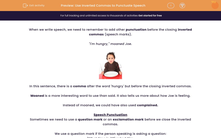When we write speech, we need to remember to add other punctuation before the closing inverted commas (speech marks).
"I'm hungry," moaned Joe.

In this sentence, there is a comma after the word 'hungry' but before the closing inverted commas.
Moaned is a more interesting word to use than said. It also tells us more about how Joe is feeling.
Instead of moaned, we could have also used complained.
Speech Punctuation
Sometimes we need to use a question mark or an exclamation mark before we close the inverted commas.
We use a question mark if the person speaking is asking a question:
"What time is it?" asked Kim.
We use an exclamation mark if the person speaking is shouting or saying an exclamation:
"Listen to me!" shouted Paul.
Notice how these sentences use better words than said.
Asked is a great word to use if the person speaking is asking a question.
Shouted is a great word to use if the person is exclaiming.
If we begin the sentence by saying who is speaking, we put a comma after their names but still begin the speech with a capital letter.
We call this part of the sentence the reporting clause.
Here are some examples of speech where the reporting clause is at the start of the sentence and followed by a comma:
Joe moaned, "I'm hungry."
Kim asked, "What time is it?"
Paul shouted, "Listen to me!"
If you look carefully at what Joe says you will see that there is a full stop this time instead of a comma after the word 'hungry'. This is because we can't finish a sentence with a comma.
Does that all make sense?









